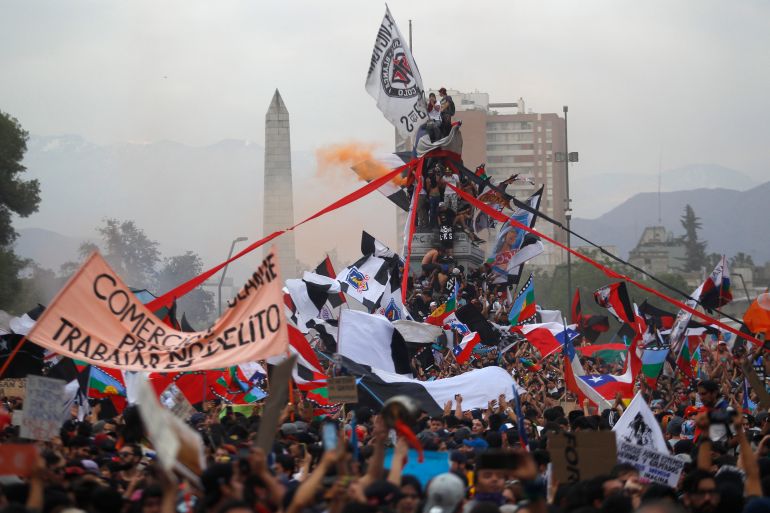We are sailing into a perfect storm
And it may hit us worse than anything that has come before it.

A perfect storm that has been brewing for decades is now about to hit us.
The COVID-19 pandemic and Russia’s invasion of Ukraine will be the immediate triggers for the coming turmoil, but it was actually the combined consequences of the gradual weakening of political representation, decline of the middle class, and rising inequities across the world that brought us here.
We witnessed massive mobilisations across the world in 2020 and 2021. As COVID-19 took hold of our lives and livelihoods, millions took to the streets to protest different grievances related to local and global issues. This discontent was expressed most clearly at the height of the pandemic, but it was not created by it – it was merely accelerated and magnified by it.
Indeed, long before the novel coronavirus emerged in China, millions across the world were already highly vulnerable – having only broken promises of social mobility, economic security and social protection. People were holding on to void promises of meritocracy and a better future, while slowly being pushed into destitution. So when the pandemic took away the little security they had, they were left with no option but to take to the streets.
The case of Chile can help us understand this better. Chileans started protesting in October 2019, months before the first COVID-19 case was recorded, in response to a 3.75 percent increase in metro ticket fares. The country was at a breaking point and a small change led to turmoil. In Chile what tipped the scales came before COVID, but in many other countries, it was the immediate consequences of the pandemic that led the masses to say “enough”.
And conditions have only worsened since.
According to the Food and Agriculture Organization of the United Nations (FAO), global food prices have been increasing at unprecedented rates since November 2021. These increases have been caused by repressed demand for goods, increases in fuel prices, and increases in the costs of agricultural supplies.
Vulnerable groups, who had already been spending most of their meagre incomes on food, immediately felt the impact of these increases. And with costs of heating also reaching unprecedented levels, many families who had just been getting by until recently have been forced to make difficult trade-offs – between heating the house and buying basic supplies, putting food on the table and paying the bus fare to get to work.
Social assistance programmes proved invaluable across the world to help people cope with these shocks. However, it is important to acknowledge that such programmes do not function equally well in every country, and even where they do, they serve only to soften the impacts of these shocks – they do little if anything to eliminate the actual sources of vulnerability.
And amid this devastation and chaos, Russia moved to invade Ukraine. Now, the war at the heart of Europe is adding fuel to the fire and pushing the world further into crisis.
As Russia and Ukraine are important suppliers of cereals, energy sources (gas and fuel), and agricultural supplies, the disruptions brought by war will further increase the costs of living and of basic staples, putting 280 million people across the world at risk of starvation. These disruptions have already affected prices and led to turmoil in many countries:
The rise in inflation is expected to be one of the leading factors that decide the result of the US midterm elections. The deepening cost of living crisis was a focal point in the recent French elections, and helped far-right leader Marine Le Pen come closer to clinching the presidency than ever before. Turmoil related to rising prices has already been observed in Peru, Indonesia, Pakistan and Sri Lanka.
The situation will only get worse in the coming months. It will become more and more costly for countries to secure staple products in the international markets. As the risk of economic defaults increases, the financial space for governments to respond to the needs of their citizens will become more constrained – and the most vulnerable will suffer even more.
We are not talking about a crisis that will come and go in a matter of weeks or months. For example, growing extra crops to cover the gap in supply created by the war in Ukraine will take at least six months. The same is true for the lost fertiliser supply. It will also take time for the energy industry to adapt itself to the new dynamics – while theoretically the oil output can be swiftly increased, the environmental consequences of such a move would also need to be considered.
This perfect storm will hit us like nothing that came before it if we do not act now. People are suffering and they will revolt in large numbers if political leaders across the globe do not implement structural reforms such as taxing wealth that does not produce quality jobs or development.
Those who have been lucky enough to remain sheltered from this devastation also need to take action.
So far, the relatively well-off across the world have mostly responded to this deepening cost of living crisis with some angry social media posts and think pieces (including this one). The international community’s response to the increased suffering of the world’s most vulnerable – beyond commendable efforts by some activist groups and communities – have not really gone beyond offering “thoughts and prayers”.
But such inaction at a time like this is a recipe for disaster. This crisis will only deepen and widen with time, eventually affecting every single one of us.
We are sailing into a perfect storm and without meaningful social solidarity and responsible action from state actors, we have very little chance of surviving it unscathed.
The views expressed in this article are the author’s own and do not necessarily reflect Al Jazeera’s editorial stance.
